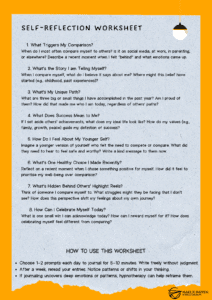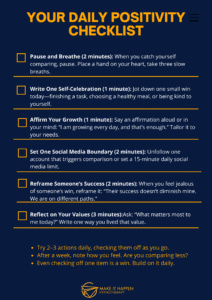You thought you were doing great in life—until you scrolled through social media. Are other peoples’ “perfect” videos and photos making you question your progress? Do you feel depressed but couldn’t stop looking?
This can happen especially if you are a modern-era high-achiever who likes to be online frequently. However, comparison can disturb your peace. You may even feel less confident in your capabilities.
Don’t worry, though. The right approach can help you learn how to stop comparing yourself with others. This guide will help you find out:
- Causes of comparison with others.
- How to become confident again.
- Strategies to thrive again with self-compassion.
*Names of clients are changed for privacy protection.
Why We Compare (And Why It Hurts So Much)
Comparison is built-in into our DNA. Our ancestors used it to cement their place in the tribe. They got more security and popularity if they were more resourceful.
Comparison Was NOT Bad in Old Times
Ancient tight-knit tribes compared people and it was mostly not harmful. Why? Because comparison made these aspects better:
- Strong community ties:
Everyone knew each other deeply. It didn’t matter if you felt “less than.” The tribe still valued you for your unique role (hunter, gatherer, healer, storyteller, etc.). Comparison also helped spot freeloaders or unfair behaviours.
- Shared survival goals:
People depended on one another. Survival maintained because of cooperation instead of just competition. People learned faster because they copied successful tribespeople.
- Immediate feedback and belonging:
You could repair your mistakes quickly if you messed up back then. You weren’t left alone with shame or inadequacy for years. Comparison also protected the group from conflict or disunity.
- Limits on who you could compare yourself to:
A tribe had maybe 50–150 people. You compared yourself to your friends and neighbours — not to millions of strangers on social media. Tribes encouraged positive comparison. It made people admire each other mostly, not resent them.
Why Comparison Feels So Bad Today?
Modern life has broken those balancing forces:
- No built-in community safety net:
Many people live isolated lives now. Your “tribe” cannot remind you of your worth if comparison makes you feel ashamed.
- No shared survival mission:
You are no longer hunting or gathering together. Modern life focuses on individual achievement now. That’s why you may feel as if you are “competing” even with friends.
- Social media magnifies it:
We compare ourselves to reels of millions of people worldwide. This scale is completely unnatural for the human brain.
- Less diverse value systems:
Tribes valued many roles (e.g. wisdom, humor, nurturing). Modern society glorifies just a few things (wealth, beauty, fame). This can make many people feel “not enough.”
| In Tribes | Now |
|---|---|
| Comparison = Growth + Belonging | Comparison = Isolation + Inadequacy |
| “They are a better hunter — maybe they can teach me.” | “They are prettier/richer/thinner — I am failing.” |
| “They gather more herbs — I will learn those skills.” | “Everyone else has a perfect life — what is wrong with me?” |
| “I am respected for my storytelling — I belong.” | “I have no value unless I am extraordinary.” |
You may see posts about:
- Promotions
- Vacations
- “Perfect” families
Mostly, such posts are pre-made. Nonetheless, they can trick your brain into thinking these people as being “ahead” in life. So, you may feel:
- Inadequate
- Envious
- A failure
Neuroscience Says…
Your nervous system has mirror neurons, says neuroscience. They activate when you see others’ win. You feel as if it is your own success. That is when your brain’s threat alarm goes off and releases the stress hormone “cortisol.”
Why? Because it wants you to get out of that illusion. But it triggers negative emotions in doing so:
- Anxiety
- Self-doubt
- Depression
Research Evidence
A meta-analysis found social media use can have negative effects on self-esteem. It happens because of upward comparison. It is a process where you compare yourselves to people you think are “better.”
According to Dr. Gabor Maté:
“Shame is the deeply painful feeling or experience of believing that we are flawed and therefore unworthy of love and belonging.”
Another research highlights that excessive use of social media increases depression. Women and young adults are especially vulnerable to it.
For example: Lisa was a millennial who felt crushed when she saw her friends living “perfect” lives online. She constantly compared her house and relationships with theirs. That made her feel stuck in her “boring and worthless” life. It wasn’t true, of course. But doom scrolling her friends’ profiles made her think so.
As Brené Brown notes, “Comparison is the thief of joy.” You must be willing to learn how to stop comparing yourself with others because makes you doubt your worth.
“Comparison is the thief of joy.” —Brené Brown
Signs You are Stuck in the Comparison Trap
You can be free of comparison when you recognise its negative mental hold. Here are signs you might be comparing:
- Feeling jealous or ashamed when others share their success.
- Obsessing over where you “should” be in life compared to friends.
- Degrading your own achievements to focus on what is missing instead.
- Feeling either demotivated or overactive but not peaceful.
- Binge-watching self-help content without changing anything.
- Trying to get validation through social media likes and comments.
- Getting anxious and tensed while comparing others’ “blessings.”
- Difficulty in sleeping because of overthinking.
Some real life examples are:
- One Gen Z client, Mia was always anxious comparing her appearance and her body shape to classmates’ posts on Snapchat.
- Sophie was a high-profile professional who hid her burnout, constantly comparing herself to LinkedIn influencers who looked like they had it all figured out.
- Megan, a mum, often felt overwhelmed with guilt when she saw ‘perfect’ parenting posts that left her feeling inadequate.
Do you relate to any of these symptoms or cases? If yes, it doesn’t mean you are weak or greedy. It means you need to learn how to stop comparing yourself with others negatively to gain peace.
How to Stop Comparing Yourself with Others (When Others Seem Ahead)
You can break the toxic cycle of:
Comparison → Anxiety → More comparison
With intentional steps. Here’s how to stop comparing yourself with others to value your unique path:
1. Catch the Thought Without Judging It
Start with self-awareness. When you get a comparison thought like:
“They are doing so much more than me.”
Pause right there.
Label it: “I am comparing again.”
UCLA research shows this reduces emotional intensity a lot. You can use these techniques to relax your nerves. Remember to use them daily:
- Focused breathing: Put your hand on your chest. Take three deep breaths slowly. Tis can relax your high-stringing nerves.
- Havening Touch: Stroke your arms or face gently. It can reduce your anxiety to make you emotionally secure.
For example: Sophie became anxious that she was not up to the mark. Why? Because her colleagues posted highlights that made them “Pinterest-worthy good.” This pause-and-reflect method suited her perfectly. She used havening for mental clarity. This made her stay calm without criticising herself.
2. Understand the Root of the Pattern
Your habit of comparing yourself to others often has roots in subconscious patterns formed during childhood. Perhaps you once felt the need to compete for your family’s approval or affection. Over time, that survival strategy can evolve into constant comparison in adulthood.
Why does this happen? Because children should never feel they have to compete for love or approval. When they do, it creates a deep sense of unsafety. As adults, we may keep comparing ourselves, trying to secure the acceptance we missed as kids. The good news is, these patterns can shift. When you help your inner child feel safe and valued, the urge to compare yourself often diminishes.
Hypnotherapy is a powerful way to uncover and transform these old, unconscious beliefs. It helps you comfort and heal your younger self hidden in your subconscious mind. In fact, research shows hypnotherapy can be up to 79% effective for relieving anxiety.
Mini Client Story: James, a driven executive, found himself spiralling into anxiety after a breakup. He constantly compared himself to his friends, whose relationships seemed “happier” and more stable. Through hypnotherapy, he discovered the root of his distress: a childhood belief that love had to be earned by being perfect. With further sessions, James was able to release this old programming and rebuild his confidence, finding renewed focus in both his personal and professional life.
3. Reconnect to Your Own Values + Timeline
What is the best way to learn how to stop comparing yourself with others? Compare with your own self. Others’ made up insta stories will always unsettle you. Ask:
- “Am I more self-aware today than I was a year ago?”
- “In what ways have I grown emotionally or mentally?”
- “Did I make healthier choices today than I used to in the past?”
Remember, others’ social media posts don’t tell their struggles. Someone may look successful but feel unfulfilled. Focus on your growth instead of their highlight reels. Also, a 2020 study confirms self-focused progress develops better well-being.
Like… A Gen Z student Emma felt very behind when she saw other students posting Tik Tok reels about “acing it” in exams. Hypnotherapy helped her value her unique academic journey. This reduced her anxiety. It also increased her focus.

4. Celebrate Micro-Wins and Rewire Internal Validation
Only you can make yourself feel worthy. Start a “self-celebration journal” to note one daily win:
- Completed a task
- Set a boundary
- Practiced self-care
Research shows self-compassion increases the sense of well-being. Loving yourself can make you more confident.
Use affirmations like “I am growing every day.” This can help change the “behind” in your mind into “becoming.”
For example: A working mum client managed her parenting anxiety with this technique. She started celebrating small wins, i.e. staying calm during her kid’s tantrum. This helped her get out of the guilt she felt watching the “perfect mums” online. She became less stressed and more peaceful.
You can also try neuro-linguistic programming (NLP) techniques for deeper healing:
- Visualise your goals daily.
- Link them to positive emotions.
- Go for internal validation instead of external.

5. Limit Exposure to Comparison Triggers
The next step in learning how to stop comparing yourself with others is to set boundaries. It will protect your mental health.
Remember, you are not avoiding anything. You are empowering yourself.
Try:
- Unfollow accounts that spark negative feelings.
- Limit social media to 30 minutes daily.
- Create “comparison-free zones,” like mornings or before bed.
Research shows you can reduce depression and anxiety within a week if you don’t use social media.
For example: Liam took intermittent Instagram breaks. This practice made him peaceful because it reduced FOMO.
You can take onsite or online therapy sessions to feel confident in creating healthy boundaries. Prioritise your well-being rather than screen time.
A Client Story – “I Thought I Was Failing at Life”
Sarah came to Make It Happen Hypnotherapy (MIHH) because she was always anxious. She compared her achievements to her friends’ social media posts.
She had a thriving career. Also, her partner was loving and supportive. Even then, reels and vlogs of her friends’ “perfect” homes and families triggered:
- Anxiety
- Low self-esteem
- Insomnia
- Tight chest
- Racing thoughts
All these symptoms co-related with the comparison trap.
MIHH’s Intervention
We had hypnotherapy sessions with her. She recognised a childhood memory during a relaxing session. Turned out, it had triggered her comparison and self-criticism tendencies:
“I must be the best if I want people to love me.”
More sessions helped soothe her younger self. That self-compassion allowed her to re-build a positive belief system.
Finally, she could:
- Celebrate her unique path
- Manage anxiety
- Improve sleep
Therapist Insight – What We See Behind the Scenes
Our dealings with clients at MIHH show:
- High-achievers can be hiding their insecurities. They may fear they are not enough.
- Parents can chase “perfect” online families where, apparently, no mishap occurs.
- Gen Z clients usually idolise the “social media truth”. It is often false.
- Social media shows the best (or made up) moments only. It hides the users pain or self-doubt.
- The habit of comparison often means that a lot of healing needs to be done.
Studies confirm multi-layered therapy builds long-term mental health stability. That’s why we use a combined approach:
- Hypnotherapy—for subconscious healing.
- Psychotherapy—for exploring thoughts, emotions, and patterns.
- Somatic Breathwork—to release stuck emotions.
In a Nutshell
Comparison negatively can make you think less of yourself. In turn, this can make you anxious and less productive. You may also doubt your capabilities. However, a holistic approach can heal you to become peaceful and confident.
Remember, you are not lacking in anything. You are growing into your uniqueness. Do you want to stop comparing yourself with others? Book a free strategy call with MIHH’s qualified therapists today to start your journey to ultimate peace.
FAQs
How can I Deal With Feelings of Jealousy When Others Succeed?
You can deal with feelings of jealousy on others’ success with calming techniques:
- Taking a pause: Hold the comparison thought and remind yourself to refocus on yourself.
- Breathing: Focused breathing can calm your body.
- Havening: Gentle strokes on face or shoulders can relax your nervous system immediately.
You can reconnect with your values when you understand that this habit often comes from your childhood insecurities, too.
Is Social Media Inherently Bad for Mental Health?
No and yes. Social media itself isn’t inherently bad. However, its “highlight reel” culture may increase your comparison tendency.
You may get stuck in upward comparison. It is a phenomenon where you start comparing yourself to people you think are better than you i.e. Instagram and LinkedIn influencers. This can make you anxious. You may also doubt yourself.
However, you can get out of it if you limit social media usage and set healthy boundaries.
How Does Hypnotherapy Help With Self-Comparison?
Hypnotherapy helps you reach and resolve negative subconscious programming. Your childhood experiences often build the need to constantly compare. This method can help you soothe your inner child to make it feel secure. As a result, you start feeling more confident and less comparing. Also, you may learn to value your path in life without outsiders’ approval.








